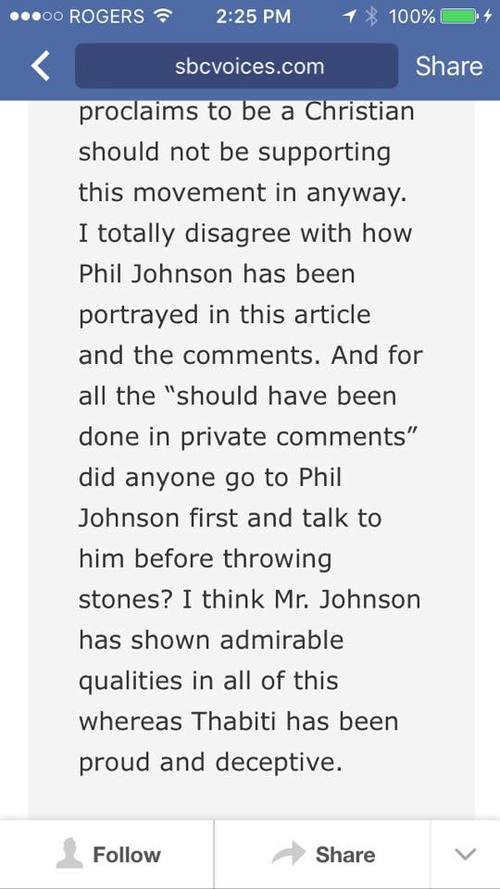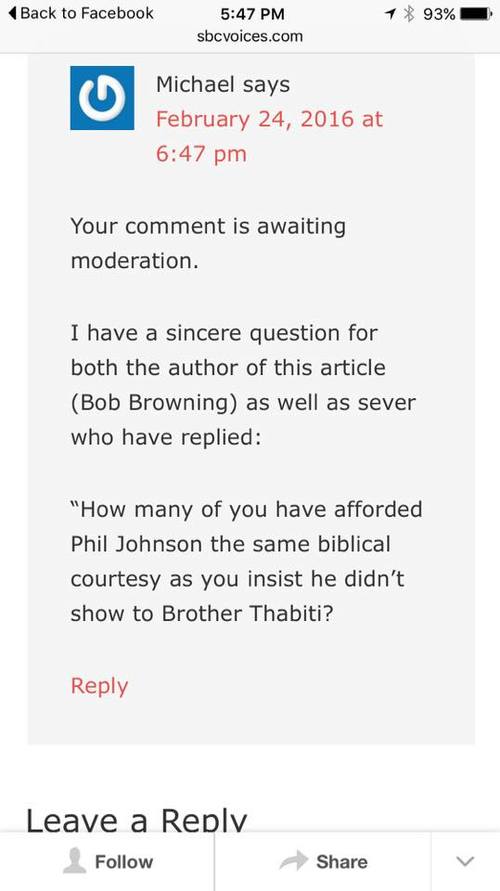SBC Voices is a place for regurgitated ideas, unoriginal thoughts, Southern Baptist scuttlebutt in the form of pumped sunshine, and a nearly endless droning on of denomination optimism, oblivious to the doctrinal downgrade and corruption that’s common place in America’s largest evangelical denomination. With material from well-meaning guest posters like this polemicist’s own big brother (link) to Dave Miller, aka The Company Man™ (link), the range of material at the fledgling website ranges from decent to detestable, from satisfactory to sycophantic.
It may seem odd that we turn our attention to a website that so few any more read, picking at what is ostensibly low-hanging fruit, but as we posted last month…
To us at Pulpit & Pen, Miller [at SBC Voices] is just an archetype. He’s an exemplar. He’s the quintessence, the embodiment, the epitome of something else. The Company Man™ is just an illustrative device, like Lewis Carroll’s Jabberwocky, whose sum total of what he represents is greater than his parts. He is the walking, breathing, blogging talisman of sycophancy whose ineffectual, epicene fingers grip tightly the throat of our beloved convention and promise to choke it to death while whispering sweet nothings in its ear.
Today’s post at SBC Voices is the embodiment of vain words, and leaves the reader with the impression that the adulator who scribbled it was attempting an original thought, but couldn’t quite cough it out. Bob Browning wrote, “What Can We Learn from ‘Dr. Phil’ and Thabiti?” and set the record for self-ignored platitudes, cognitive dissonance and startling self-contradiction.
I wouldn’t expect Phil Johnson to have the time to respond to Browning, nor be the slightest bit aware of Browning or SBC Voices’ existence, and so I will respond. I am not Johnson’s surrogate, I am an annoyed Southern Baptist.
Browning discusses an event that happened several weeks ago, which in the blogging world was the equivalent of years ago, which is fitting for a group-blog that is as irrelevant as it is extraneous. Chiefly, Browning was opining – although not so far as I can tell, with any originality – on the skirmish between Grace to You’s Phil Johnson and the Gospel Coalition’s Thabiti Anyabwile. For the sake of clarity and expediency, I’ll summarize the events as follows:
- Anyabwile, for some time, seemingly affirms the communist, racist and self-labeled “queer-affirming” Black Lives Matter organization. Then, Anyabwile leaves the impression (even among his Evangelical Intelligentsia colleagues Joe Carter, Denny Burk and others) that he has affirmed the candidacy of socialist Democratic presidential candidate, Bernie Sanders as the best candidate for African Americans. When someone pointed out Sanders’ pro-choice beliefs, Anyabwile repeated the Democrat Party talking point that we should “care for the living.“
- Phil Johnson posted a video in social media from Anyabwile in 2010 discussing the type of social activism in which he is clearly now engaged (being an “agitator” for the Black Lives Matter movement) as “mission drift” and pointed out that 2016 Anyabwile should listen to 2010 Anyabwile.
- Anyabwile posted a lengthy response at The Gospel Coalition, asserting that, among other things, Johnson’s use of the word “agitator” in his social media post had racist undertones, although stops short of accusing Johnson of racism. Anyabwile reiterates his conservative credentials and claims that he’s not endorsing the organization, Black Lives Matter, merely by retweeting them, using their hash tag, and repeating their talking points. He claims that his tacit endorsement of Bernie Sanders as the best candidate for African Americans was misunderstood.
- Johnson responds at the blog, Pyromaniacs, and gives a rejoinder that was thoughtful and considerate, while pointing out that “agitator” eludes to communism and not racism, and gives a brief history of the word. He says that would be his last response.
- Anyabwile responds again at the Gospel Coalition website in a 3,394 word treatise, essentially reiterating that he supports “Black Lives Matter” as a principle rather than as an organization, and again reiterating that “agitator” is kinda racisty whether Phil agrees or not.
Browning provides four points for your consideration, each one more pregnant with contradiction, irrationality and a glaring vacancy of self-awareness than the next.
1. Browning questions the “goal” of Johnson’s original social media post, asserts that it was unbiblical, and derides Johnson’s “tone” as not turning away wrath. He characterizes Johnson’s post as a “hit and run.”
The “goal” of Johnson’s social media post, obviously, is conspicuous in the post itself. It was, incontestably, to make a point. And that point was simple: Here is Anyabwile in 2010 speaking very plainly against the behavior he is now engaged in. I compliment his words then, and believe he should heed them now.
I don’t know how the goal isn’t clear to Browning. Social media is the modern Marketplace of Ideas. It’s where thoughts come to be born, disseminated, sold and distributed for public consumption. Social media is for more than posting pictures of cats and Pinterest recipes. It’s the Marketplace of Ideas. You know, it’s a place for opinions and stuff.
Johnson’s goal, I presume without any kind of esoteric omniscience into the man’s mind, was to flavor the already public discussion with a dash of helpful polemics. Social media was abuzz with talk of Anyabwile’s surprising and stunning comments that were shocking even to his friends. Johnson provided helpful words, and they happened to come from Anyabwile’s own mouth in 2010.
Plucking a scripture verse from what is apparently the First Epistle of Impertinency, Browning drags out “a soft answer turneth away wrath.” What question was Johnson answering? Whose wrath was being turned away? The wagging finger of shaming accusation is oscillating wildly at this point, and without further clarification I can only assume that Browning grabbed it from the bottomless bag of random verses. Johnson’s post was not returning wrath for wrath, in that he was not responding to wrath, and he did not respond wrathfully. Read Johnson’s post again. Real slow this time, maybe. It was clear, straight-forward, not needlessly provocative and was articulate and precise. There were no ideological Molotov cocktails thrown and no personal insults given.
In terms of Browning’s claim that Johnson’s social media post was a “hit and run,” I suppose the only way of determining if such is true would be if Johnson ran. Clearly, he didn’t. Anyabwile responded, and then Phil responded with a “gracious and clear reply” (that’s a quotation from Anyabwile). For example, if Browning doesn’t respond to this post, then his post may be considered a hit and run. Johnson’s post, by the sheer and naked facts, clearly cannot be characterized in such a way.
2. Browning accuses Johnson of wrong-doing for making his “accusation” against Anyabwile publicly without going to him first privately.
Making use of 1 Timothy 5:19, which contextually deals with how accusations regarding private, secret sin should be made publicly, Browning not only misapplies the Scripture but does so in an epic lack of self-awareness. First, public errors don’t have to acquire two or three witnesses for accusations to be made publicly, because the errors are already public. Make sense? For example, if I’m arrested and convicted of DUI, we’ve already moved beyond the “two witnesses” stage of discipline. If I beat my dog or cat privately, there need to be two witnesses to assert such publicly. If I beat up my wife on the front lawn and it makes the papers, we can go ahead and deal with this publicly. Thabiti’s gross errors in judgment in making repeated statements and gestures that reasonable people would assume are affirmations of Black Lives Matter and Bernie Sanders were already public. There is no need to approach him privately. Polemicists have to deal with this all the time, and it is tiring to have to cope with this level of pervasive ignorance when it comes to public rebuke versus private admonition. We (that is, polemicists) do not have to invite Joel Osteen over for coffee to critique his theology. If Perry Noble happens to teach that the Ten Commandments are Ten Promises (he did), we don’t have to approach him privately before pointing out his error. If Anyabwile is asserting his flawed worldview publicly, one in which violent police-attacking criminals are innocent parties and the police are the bad guys, one in which a socialist presidential candidate who believes the genocide of black babies is a matter of choice is the best candidate for African American voters, then it is perfectly within the right of one to address his public error publicly (and I recognize there was not nearly enough nuance and whimsy in how I characterized his positions, but there it stands).
Browning’s assertion is that it was wrong for Johnson to address Anyabwile’s perceived errors publicly without first approaching him personally.
So then, Browning publicly addressed Johnson’s perceived errors without first approaching him privately. Like Anyabwile, Johnson is an elder. Hello, pot. I’m kettle.
You could cut the cognitive dissonance with a knife. A knife made of irony, maybe. Does Browning believe his own moral platitudes? Apparently, he does not.
Browning’s third point is just a mishmash of pointless syllables that don’t really make a point of anything, so I’ll go to his number 4.
4. Browning claims that [Anyabwile] has defended himself well enough to dispel [Johnson’s] accusations.
Upon reading his assertion, I put my mobile device at tad closer to my face to see why Browning claimed that Anyabwile dispelled Johnson’s accusations. And…nothing. Browning made a claim with absolutely no attempt to support it. The bold assertion was truly a drive-by allegation. The one thing that would have been helpful in Browning’s post would have been a thoughtful and intelligent, fact-based attempt to demonstrate why Johnson was wrong and Anyabwile is not experiencing mission drift. Instead, reading Browning’s fourth point was like watching a stump speech for a friend running for junior high class president. “He’s better and right and good…because.” Why? “Because.”
Instead of providing a single substantive idea or addition to the conversation, Browning came across as lobbing an uber-simplistic ruling in a popularity contest, with no meaningful purpose or argument. Browning’s entire article was heretofore a lecture on subjective tone, characterized by inaccurate and abstract accusations of Johnson’s presumed poor intentions, and in the one place he could have provided a substantive point-counterpoint regarding the actual issue at hand (whether or not Anyabwile’s own words convict himself of mission drift) he biffs it. He then repeats his first point, making his fourth point a repetitious bag of repetitious repetition. He writes…
My final observation is that when we feel compelled to confront a brother over something we believe is out of step with the gospel, then we should endeavor to believe the best about that brother rather than jump to the worst of conclusions. When we resort to strawman arguments and nasty name-calling we have put our lamp under a basket and instead have taken up the scheme of Satan. May God help us to recover a love for one another that helps us guard our hearts against such tactics. When we must address or even rebuke a fellow brother, we can prepare ourselves for the disappointment if our fears are confirmed, but we should be earnestly hoping that there is a simple misunderstanding, even if it means we might be the ones who look foolish. This type of character should be natural for Christians who have been shown grace upon grace by a God who had every right to sentence us to eternal damnation.
Question to Bob Browning: Before confronting Phil Johnson over something you believed was out of step with the gospel, did you endeavor to believe the best about that brother rather than jump to the worst of conclusions? Did you resort to straw-man arguments, or did you contact Phil to see his actual goals and intentions?
Mr. Browning, I would pray that you would recover a love for others that helps you guard your heart against such tactics. If you must address or even rebuke a fellow brother, you should be earnestly hoping that there’s a simple misunderstanding, even if you look foolish. Seriously, Bob, this type of character should be natural for Christians who have been shown grace upon grace by a God who had every right to sentence us to eternal damnation.
How do Dave Miller and the boys over at SBC Voices not read this post and ask, “Hey, Bob. Did you talk to Phil privately before making these public accusations about him making public accusations without first approaching someone privately? Just want to check, you know. Don’t want you to look downright hypocritical.”
Instead of addressing the substance of Johnson’s post, Anyabwile chose to focus on the subtle (and supposed) racism of the word “agitator” and that colored (no pun intended) the rest of the online discussion on this topic. The rhetorical trick did its job, and people were accusing Johnson of racism in the various threads where Anyabwile’s article was posted. Others, like Browning, have settled for calling Johnson (my paraphrase) a meany-pants. Few have taken heed of Johnson’s original post, and compared the words of Anyabwile in 2010 to the behavior of Anyabwile in 2016.
[Contributed by JD Hall]
[Editor’s Note: A number of good-hearted souls have attempted to point out the hypocrisy and double-mindedness of The Company Man and the gang over at SBC Voices and left correcting comments, which heretofore, have not made it out moderation. We’re still waiting:




















